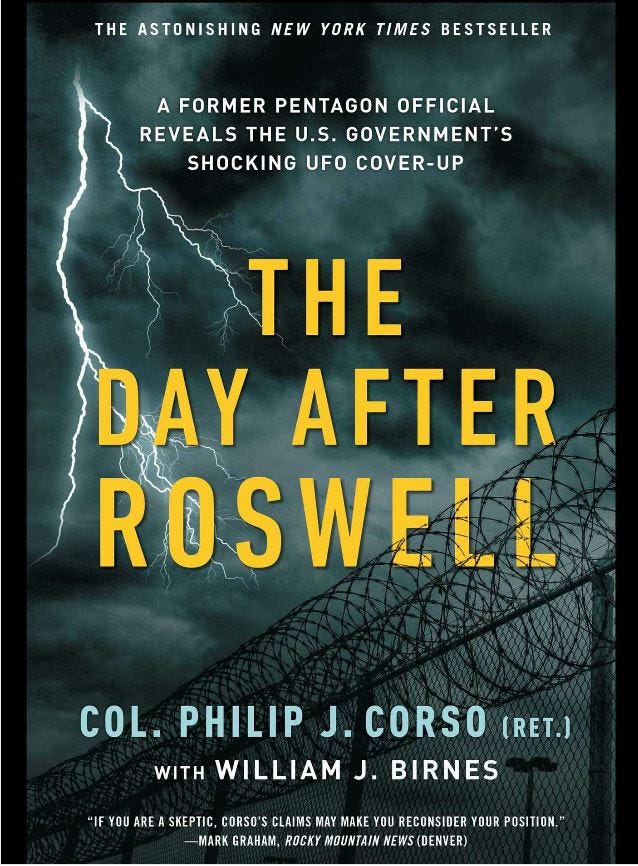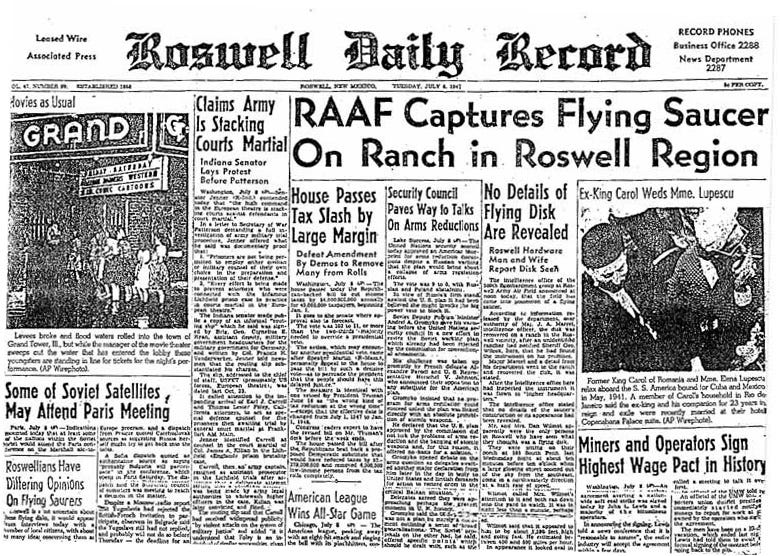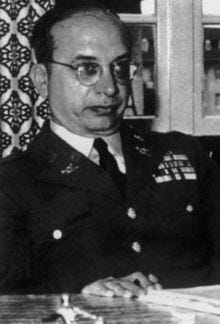The Day After Roswell (Corso, P., Birnes, W., 1997) is also an excellent source to help us understand the Alien Presence.
Colonel Philip J. Corso’s book explains in detail how he covertly released alien technology from the Roswell crash into our world through his position as head of the Foreign Technology Desk at the U.S. Army's Research & Development department.
Corso fed the alien technologies to military contractors, then they were released into mainstream industrial development.
The foreword to Corso’s book was written by Senator Strom Thurmond, who gives Corso a glowing recommendation. Here is an excerpt:
The colonel had a great deal of credibility and expertise not only as a military officer but also in the fields of intelligence and national security. A veteran of World War II and Korea, Corso had also spent four years working at the National Security Council. In short, he was very familiar with issues that concerned me and my colleagues on the Senate Armed Services Committee, and he very quickly became a valued source of bountiful information that was insightful and, most important, accurate. (Foreword)
Corso is absolutely authentic. No one disputes his credentials or military record.
Even Wikipedia does not attempt to defame or discredit him. They merely report that he made an appearance on Coast to Coast AM with Art Bell, then state “Corso died of a heart attack less than a year later” (Wikipedia.org).
Corso’s book is definitive disclosure.
Some of the alien technologies released include Kevlar (p. 4), night vision, integrated circuits, lasers, fiber optics and particle beam weapons (p. 125).
These alien technologies have had an enormous impact on human societies. We now have the most technological, industrialized and connected global civilization the world has ever known.
Aside from the explosion in alien technology, the main theme in Corso’s book is that the Alien Presence is hostile.
Corso paints a picture of a covert war against hostile space aliens ongoing from 1947: “UFOs were displaying hostile intentions not only to the United States but to the Soviets, the Italians, and the Scandinavians as well” (p.287).
The book is filled with amazing revelations. For example, Corso names the 12 men who formed “Majestic 12” (p. 67; p. 80).
The most poignant scene for me is Corso’s description of Truman’s military advisors, Secretary of Defense James Forrestal and Central Intelligence group director Adm. Roscoe Hillenkoetter, advising President Truman that the existence of the crashed aliens and their saucer had to be kept secret.
“And there’s one final point,” Truman was said to have brought up to his Central Intelligence group director and secretary of defense. It was a question so basic that its apparent naiveté belied an ominous threat that it suggested was just over the horizon. “Do we ever tell the American people what really happened?” There was silence. (p. 75)
Truman, who had inherited the Office of the President two years prior following the death of FDR, was out of his depth.
Corso credits General Nathan Twining as the mastermind who directed the handling of increasing waves of sightings and encounters among the American people, while still maintaining plausible deniability. Twining’s plan:
They would form nothing less than a government within the government, sustaining itself from presidential administration to presidential administration regardless of whatever political party took power, and ruthlessly guarding their secrets while evaluating every new bit of information on flying saucers they received. But at the same time, they would allow disclosure of some of the most far-fetched information [emphasis mine], whether true or not, because it would help create a climate of public attitude that would be able to accept the existence of extraterrestrial life without a general sense of panic. “It will be,” General Twining said, “a case where the cover-up is the disclosure and the disclosure is the cover-up. Deny everything, but let the public sentiment take its course. Let skepticism do our work for us until the truth becomes common acceptance.” (pp.81-82)
Regarding our trips to the moon, where Corso asserts there is an alien base, Corso says, “They buzzed our ships, interfered with our communications, and sought to threaten us by their physical presence” (p. 170).
In spite of these intimidations, we asserted enough control over our skies to land on the moon ahead of the Soviets. This milestone proved that the United States would defend our skies, and our moon. Corso also makes this cryptic comment:
It also demonstrated that if there were any deals to be made, any proxy relationships to establish, the Soviets were not the ones to deal with. (p. 171)
For our purposes, the mic drop moment is when Corso sums up the situation after 1974 in reference to the advanced space-based weaponry of the Strategic Defense Initiative (SDI):
We [United States, Soviet Union] both knew who the real targets of the SDI were, and it wasn’t a bunch of ICBM warheads.
It was the UFOs, alien spacecraft thinking themselves invulnerable and invisible as they soared around the edges of our atmosphere, swooping down at will to destroy our communications with EMP bursts, buzz our spacecraft, colonize our lunar surface, mutilate cattle in their own horrendous biological experiments, and even abduct human beings for their medical tests and hybridization of the species [emphasis mine].
And what was worse, we had to let them do it because we had no weapon to defend ourselves. These creatures weren’t benevolent alien beings who had come to enlighten human beings. They were genetically altered humanoid automatons, cloned biological entities, actually, who were harvesting biological specimens on Earth for their own experimentation.
As long as we were incapable of defending ourselves, we had to allow them to intrude as they wished. And that was part of what the working group had to deal with.
We had negotiated a kind of surrender with them as long as we couldn’t fight them. They dictated the terms because they knew what we most feared was disclosure [emphasis mine]. Hide the truth and the truth becomes your enemy. Disclose the truth and it becomes your weapon.
We hid the truth and the EBEs used it against us until 1974 when we had our first real shootdown of an alien craft over Ramstein Air Force Base in Germany. (pp. 292-293)
We already know about the cat-and-mouse games with the military, probing and testing our defenses. We know about the cattle mutilations and abductions. From our last discussion of Richard Dolan’s first volume, we know that many different types of aliens were coming here in the 1950’s.
What I find most compelling is the statement “We had negotiated a kind of surrender with them as long as we couldn’t fight them. They dictated the terms because they knew what we most feared was disclosure.”
Does this sound like a treaty with space aliens? I think so.
In the Afterword of his book, Corso is reticent about the moral implications of the insane coverup of the Alien presence and ultimate cost to Humanity, which has yet to dawn in the minds of most people:
So what do I think about all of this, about what happened and what I did? I believe that because at the time I was so much in the routine of a military intelligence officer, I didn’t really stop to think about the implications of UFOs and EBEs. I understood that we were fighting a Cold War with the Soviets and a skirmish war with extraterrestrials. I believed that their intentions were, and still are, hostile, and I believe that we took the steps necessary to develop the weapons that can blunt their threat. In fact, the U.S. military has better, more accurate, and more powerful weapons for killing UFOs than were deployed in the movie Independence Day. (Corso, 1997, p.299)
The Nazi security state continues to manipulate and psyop the American people concerning the Alien Presence, offering the excitement of disclosure and the pain of deception.
Earlier in the book, Corso makes a very astute observation:
Those of us in the military who knew what was happening also felt that we could be experiencing an invasion that was more of an infiltration. They were compromising our very systems of defense and government…(p. 283)
Based on what we are learning about the Alien Presence, it is possible that a military-style invasion of our planet is not their plan.
John’s Substack
John’s Book Electromagnetic Revolution https://amzn.to/3sIF8UQ
References
Birnes, William J.; Corso, Philip (1997). The Day After Roswell. Atria Books. Kindle Edition.
Wikipedia.org https://en.wikipedia.org/wiki/Philip_J._Corso








Thanks for the insights on this fascinating topic!
Have you seen this doc? Particulare interesting is the chapter "Lasers to DEWS"
https://archive.org/details/PhilipJ.Corso-DawnOfANewAge/mode/1up